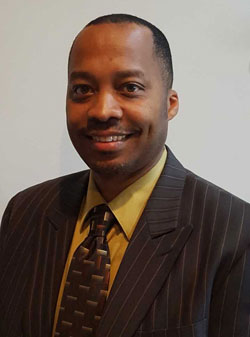Caledonia ー Reflecting on the end of fall semester and 2020, Superintendent Dedrick Martin sat down with School News Network to discuss how Caledonia adapted to school closures, virtual learning and social distancing during the COVID-19 pandemic.
Martin praised students for their resilience and teachers for helping “cultivate agile learners,” but noted the challenge of the pandemic for education students on the margins.
An abridged version of that conversation follows.
SNN: Looking forward to 2021, what are your thoughts on the ways the COVID-19 pandemic has impacted education in Caledonia?

Martin: Ironically, one of our taglines we adopted in our schools is “Cultivating Agile Learners”; the past year fits the mantra of having to be agile as a learner and staff. Together, we’ve embarked on the things we felt were the right things to do for our schools. COVID-19 fast-forwarded a lot of our goals for virtual learning and providing technology resources to our families. Our original timeline for developing full K-12 online learning still had us three to four years out. We’ve accelerated the learning curve of what we’d like to see and what didn’t work last year.
In our community, people want face-to-face learning but some families have found remote learning works for their lifestyle and their kids. For others, we’re finding connecting with people over tech is not enough. People are social beings.
How do you see Caledonia schools and the education system as a whole reinventing?
Moving forward, public education will not look or feel the same. By and large, the value for public education has been under attack. Now that families have to be more hands-on with their child’s learning, we’ve seen more appreciation for what teachers do on a daily basis. It’s been a while since I’ve been in the classroom, but being a teacher is tough work. Hopefully people in general have a better understanding of what it takes to educate kids, while attending to their social and emotional needs.
What lessons have you learned from the COVID-19 pandemic that apply to life outside of work?
I’ve developed more patience and grace for things I cannot control. We try as much as possible to control dynamics, but none of us can control this pandemic. We can look at what is within our control and how can we adjust.The pandemic has brought about more appreciation for things I took for granted. In the real world we may not always agree, but you have to learn to co-exist peacefully. Schools teach that.
How has the pandemic affected education for marginalized communities?
The unfortunate side to what we’re experiencing is seeing those who are marginal slip through the cracks. That continues to be a challenge. The positive to come out of this is a lot of school districts have doubled down on social-emotional support for those students and families. That population grew throughout all this, but it drives important conversations to add additional support staff in schools to benefit students in need.
‘Now that families have to be more hands-on with their child’s learning, we’ve seen more appreciation for what teachers do on a daily basis.’
— Superintendent Dedrick Martin
We’ve also witnessed a statewide acknowledgement for the hundreds of families who have no or limited access to tech. Wi-Fi is not universal and free, unless you have the funds for devices and access. We still have some of those barriers to overcome, but we’ve made strides by getting devices in the hands of our students. Our plan for the years to come is for every one of our kids to have a device if they need it, as well as provide tutorial information for families.
What is your outlook moving forward into the new year?
It goes back to cultivating agile learners; we have to be agile adults ourselves. Our teachers and staff came together to provide comfort and security, feed families and check in on students’ wellness often. COVID-19 has not been our friend, but I am very proud of how we’ve responded as a community.









